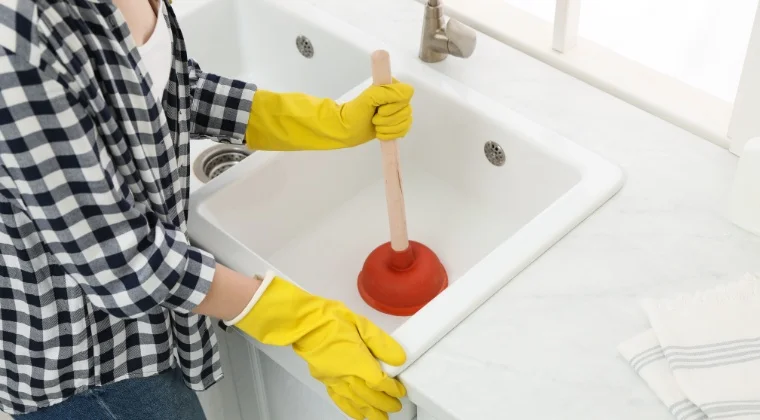
Essential Tips and Tricks for Unclogging Kitchen Sink Drain
The kitchen sink, a hub of culinary activity and cleaning rituals, often falls victim to a common yet frustrating dilemma: clogged drains.
When faced with this inconvenience, it is crucial to address the issue promptly to avoid disruptions to your daily routine.
From simple DIY methods to more complex solutions, the key lies in understanding the underlying causes of these blockages and using effective strategies to restore functionality to your sink.
Stay tuned to uncover practical tips and proven techniques that can help you combat this household nuisance and keep your kitchen running smoothly.
Key Takeaways
- Use boiling water, plunging, baking soda & vinegar, or a plumber's snake to unclog sink drains.
- Check and reset garbage disposal to ensure proper functioning after unclogging.
- Avoid harmful items like grease and coffee grounds to prevent future clogs.
- Consider preventative maintenance such as using drain covers and being prepared for plumbing issues.
How to Unclog a Kitchen Sink Drain
To effectively clear a clogged kitchen sink drain, employing a combination of plunging with a flat-bottomed plunger and utilizing hot water can prove to be highly efficient methods.
- Start by filling the sink with hot water and plunging vigorously to dislodge small clogs.
- Confirm a tight seal with the plunger for better results.
- If this method doesn't fully clear the blockage, consider using a mixture of baking soda and vinegar.
- Pour baking soda down the drain, followed by white vinegar, then cover and wait for 15 minutes before flushing with hot water.
This approach can help break down organic materials causing the clog.
Remember to repeat these steps as needed until the drain runs smoothly again.
Using Baking Soda and Vinegar Method
When faced with a clogged kitchen sink, utilizing the baking soda and vinegar method can be an effective solution.
This natural approach involves creating a chemical reaction that helps break down and dislodge clogs in the drain.
Plunging the Sink
Employing the baking soda and vinegar method when plunging the kitchen sink offers a natural and environmentally friendly approach to dislodging clogs efficiently.
- Start by pouring baking soda down the drain, followed by white vinegar to create a fizzing reaction. This fizzing action helps break down and dislodge clogs in the kitchen sink drain.
- Allow this mixture to sit for about 15 minutes, then flush the drain with hot tap water to help clear the clog effectively.
This method is not only gentle on your pipes but also a sustainable way to maintain your sink.
Preventing Future Clogs
Implementing the baking soda and vinegar method is an effective strategy for preventing future clogs in kitchen sink drains.
This natural and cost-effective approach not only helps in maintaining a clear and odor-free drain but also contributes to environmental sustainability.
Here are five simple steps to prevent future clogs using baking soda and vinegar:
- Regularly pour baking soda down the drain.
- Follow with a generous amount of white vinegar.
- Allow the mixture to sit for about 15 minutes.
- Flush the drain with hot water to clear any remaining debris.
- Repeat this process periodically to guarantee ongoing effectiveness.
Dealing with a Clogged Kitchen Sink
When faced with a clogged kitchen sink, it's important to understand the causes of these blockages, such as grease solidifying in pipes or food scraps accumulating.
To effectively deal with the issue, consider using boiling water to clear the blockage, checking the P-Trap for any obstructions, and utilizing methods like plunging or using baking soda and vinegar.
Find out about clean solutions for unclogging bathroom sink
Causes of Clogs in Sink Drains
Clogs in kitchen sink drains often result from various factors such as grease solidification, food scraps, hair accumulation, soap scum buildup, and the presence of dirt and debris.
- Grease, oil, and fat solidifying in pipes
- Food scraps, particularly large or fibrous ones
- Accumulation of hair from washing dishes or personal grooming
- Buildup of soap scum over time
- Entry of dirt and debris into the sink drain
Understanding these common causes can help in preventing clogs and maintaining a smoothly running kitchen sink.
Using Boiling Water to Clear the Blockage
To address a clogged kitchen sink, utilizing boiling water can serve as an effective method for clearing blockages caused by hair, grease, and soap residue.
Boiling water can effectively loosen these obstructions in kitchen drains.
This method is simple, cost-effective, and eco-friendly, avoiding the need for harsh chemicals.
It is advisable to exercise caution when using boiling water on PVC pipes to prevent damage.
Repeating the process may be necessary if the blockage persists, allowing for smoother drainage without the use of abrasive substances.
Checking the P-Trap for Blockages
Inspecting the P-trap for blockages is an important step in effectively addressing a clogged kitchen sink, as this U-shaped pipe plays an essential role in trapping debris and preventing it from obstructing the main drain.
To check for blockages, position a bucket underneath to catch any spillage. Using a wrench, loosen the slip nuts on the P-trap and carefully remove it to access potential blockages. Look for food particles, grease, hair, or other debris causing the clog.
After cleaning, securely reattach the P-trap using the slip nuts. Finally, run water to make sure the blockage has been cleared.
This thorough inspection and maintenance of the P-trap are critical in maintaining a free-flowing kitchen sink drain.
Unclogging a Kitchen Sink with a Garbage Disposal
When dealing with a clogged kitchen sink equipped with a garbage disposal, it is important to address specific techniques tailored to this setup.
Tips for clearing the disposal and preventing future clogs in garbage disposals will be highlighted to make certain effective maintenance.
Tips for Clearing the Disposal
In dealing with a clogged kitchen sink due to a garbage disposal, it is vital to first ascertain if the disposal unit is the root cause by running it and listening for any unusual noises.
Once confirmed, follow these tips to clear the disposal effectively:
- Reset the Disposal: Locate the reset button on the unit and press it to clear minor clogs.
- Avoid Certain Foods: Refrain from putting fibrous or starchy foods like celery or pasta into the disposal.
- Safety First: Make sure the disposal is turned off before attempting any unclogging methods to prevent injury.
- Regular Maintenance: Clean and freshen the garbage disposal by using ice cubes and citrus peels regularly.
- Prevent Odors: To prevent buildup and odors, consider running ice and citrus peels through the disposal frequently.
Preventing Clogs in Garbage Disposals
To maintain a properly functioning garbage disposal and prevent clogs in the kitchen sink, it is essential to adhere to specific guidelines for disposing of food waste and conducting routine maintenance.
When using the garbage disposal, avoid putting hard items like bones or fruit pits down the drain as they can lead to clogs.
Remember to run cold water while the disposal is in use to help solidify grease for easier disposal. Regularly clean the garbage disposal with ice cubes, salt, lemon peels, or baking soda to prevent buildup that could cause blockages.
Additionally, using a drain cover can help catch food scraps and prevent them from entering the disposal, ultimately reducing the risk of clogs.
Hiring a Professional Plumber for Sink Drain Issues
Professional plumbers play a crucial role in resolving stubborn sink drain issues that DIY methods may not effectively tackle.
Knowing when to call a plumber, understanding common drain problems that require professional assistance, and finding a reliable plumber are key aspects to consider when faced with persistent clogs.
By entrusting the task to a qualified plumber, individuals can ensure a thorough diagnosis, safe resolution, and long-term prevention of sink drain problems.
When to Call a Plumber
A skilled plumber should be contacted when persistent clogs in the kitchen sink drain remain unresolved despite multiple DIY unclogging attempts.
If standing water and slow drainage persist, it could indicate a more serious issue within the pipes that requires professional intervention.
Plumbers possess the expertise to assess the situation, locate blockages using specialized equipment like drain snakes or cameras, and effectively clear the clogs without causing damage to the pipes.
Trusting Berkeley Plumbing Pros to address the problem can save time and provide peace of mind regarding your plumbing system's health.
Common Drain Problems Requiring Professional Help
When facing persistent clogs that resist DIY methods, complex drain issues in the kitchen sink may necessitate the expertise of a skilled plumber.
Professional intervention becomes essential when dealing with issues such as damaged pipes, tree root infiltration, or severe blockages that require a plumber's expertise.
Berkeley Plumbing Pros possess specialized tools and equipment to accurately diagnose and effectively resolve intricate drain problems.
How to Find a Reliable Plumber
How can one guarantee the credibility and quality of plumbing services when seeking a reliable plumber for kitchen sink drain issues?
When looking for a plumber to unclog kitchen drains:
- Make sure they possess proper licensing and insurance for credibility and protection.
- Check online reviews and ratings to assess their reputation and service quality.
- Obtain quotes from multiple plumbers to compare prices and services offered.
- Seek referrals from friends, family, or neighbors who have dealt with similar plumbing issues.
- Inquire about the plumber's experience and expertise in addressing kitchen sink drain problems specifically.
Clogged kitchen sink drain? Our Professional Plumbers Can help
In situations of a clogged kitchen sink drain, seeking assistance from professional plumbers can provide efficient solutions and expert guidance to resolve the issue effectively.
Professional plumbers have the necessary tools and expertise to identify the root cause of the clog, whether it be grease buildup, food particles, or other obstructions.
Berkeley Plumbing Pros can offer valuable maintenance tips to help prevent future clogs and maintain the smooth functioning of the kitchen sink drain.
Frequently Asked Questions
How do you unblock a slow draining kitchen sink?
Try using a plunger or a plumber's snake to dislodge the blockage in the drain.
What can you pour down a sink to unclog it?
A mixture of hot water, baking soda, and vinegar can help break down clogs in the sink.
Will vinegar and baking soda dissolve hair clogged in a drain?
Vinegar and baking soda may help break down hair clogs in the drain, but for stubborn blockages, you may need to use a drain snake or call a professional plumber.

